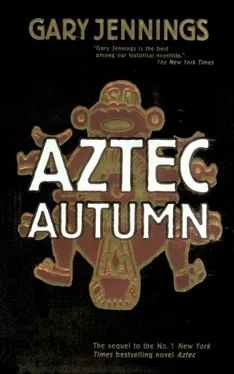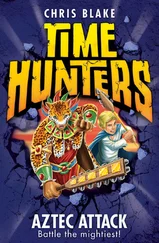Gary Jennings - Aztec Autumn
Здесь есть возможность читать онлайн «Gary Jennings - Aztec Autumn» весь текст электронной книги совершенно бесплатно (целиком полную версию без сокращений). В некоторых случаях можно слушать аудио, скачать через торрент в формате fb2 и присутствует краткое содержание. Жанр: Старинная литература, на английском языке. Описание произведения, (предисловие) а так же отзывы посетителей доступны на портале библиотеки ЛибКат.
- Название:Aztec Autumn
- Автор:
- Жанр:
- Год:неизвестен
- ISBN:нет данных
- Рейтинг книги:4 / 5. Голосов: 1
-
Избранное:Добавить в избранное
- Отзывы:
-
Ваша оценка:
- 80
- 1
- 2
- 3
- 4
- 5
Aztec Autumn: краткое содержание, описание и аннотация
Предлагаем к чтению аннотацию, описание, краткое содержание или предисловие (зависит от того, что написал сам автор книги «Aztec Autumn»). Если вы не нашли необходимую информацию о книге — напишите в комментариях, мы постараемся отыскать её.
Readers familiar with Mexican history will welcome the rich details of this vengeance drama; those new to it will be impressed by Jennings's exhaustive research.
Aztec Autumn — читать онлайн бесплатно полную книгу (весь текст) целиком
Ниже представлен текст книги, разбитый по страницам. Система сохранения места последней прочитанной страницы, позволяет с удобством читать онлайн бесплатно книгу «Aztec Autumn», без необходимости каждый раз заново искать на чём Вы остановились. Поставьте закладку, и сможете в любой момент перейти на страницу, на которой закончили чтение.
Интервал:
Закладка:
During all that turmoil, other people were dodging among us or scampering around us, in a panic to get out of the contested area, and many others could be seen, farther off, likewise fleeing from the town into the open country. None wore armor or uniform, and most were barely dressed, having leapt straight from their night's pallets. They were the slave inhabitants of this quarter where we had chosen to strike—or most of them were. The tumult had of course wakened all of Tonalá, so more than a few Spanish men, women and children, equally ill-clothed, were among the fugitives, obviously and unashamedly hoping to be mistaken for slaves themselves, and let to go free. But not many of those got away. We marauders allowed the passage of everyone of our own color, or darker, but every white-skinned person of whatever sex or age who came within our reach we instantly skewered or hacked or clubbed to death. To my regret, two of the Spaniards' horses also got killed, inadvertently, and four or five others wandered skittishly about, riderless, wild-eyed, wide-nostriled, trying to snort away the smells of blood and pólvora smoke.
When every last Spanish officer and soldier and pretended slave lay dead or dying, my three mounted comrades rode off into the streets of the town, the Aztéca warriors hooting and howling behind them. I stayed at the scene of this first combat for a brief while, partly to count our own fallen people. They were very few, compared to the Spanish losses. And the male slaves of our company who had been detailed as Swaddlers and Swallowers would shortly be arriving, either to bind up the wounds of any warriors who might be revived or to slip an easeful blade into those who were beyond the help of any tíciltin.
But what mainly detained me at the scene was the fact that all the Yaki also were staying, every man of them vigorously sawing at the head of a Spanish corpse, usually using the belt knife that the soldier had worn when he was alive. After a warrior had cut a circle in the skin around the head, from nape of neck, above the ears and eyebrows, back to the nape, he had only to give a sudden, forceful tug, and the hair and scalp and forehead skin came ripping away, leaving the cadaver crowned with only a pulp of raw flesh that oozed blood. Then the Yaki would dash away to another and do the same. However, some of the fallen Spaniards were not yet quite corpses. Those could and did shriek or moan or convulse when the tug was given, and their heads' exposed pulp bled profusely.
Cursing vehemently, I edged my horse here and there among that carnage, swatting at the Yaki warriors with the flat of my sword and pointing townward with it, shouting orders. They flinched and grumbled in their unlovely language—I gathered that they were accustomed to collect enemy scalps while they were fresh and easy to cut loose. But I did my best to convey, with gestures, that there would be many more scalps, far more than enough to adorn every Yaki's skirt, and I cursed some more, and urgently waved them onward. They went, still grumbling, and only slowly at first, but then running, as if it had suddenly occurred to them that others of our army might already be harvesting the finest-quality scalps of the townsfolk.
It was not difficult for me to follow my men who had preceded me, for they seemed to have gone spreading havoc everywhere. Whatever street I took, whatever cross street I turned into, there lay corpses everywhere—half-clad, bloody, pierced or slashed or thoroughly mangled—sprawled on the street cobblestones or across their own homes' thresholds. From some houses, the residents had not had time to flee, but I could tell that there were bodies inside, for much blood had flowed out the open doors. Only once in those ravaged streets did I come upon a living white person. A man wearing nothing but his underclothes, bleeding from a gash in his neck that had failed to kill him, came running up to me, ranting insanely. In his hands he held, by their hair, three severed heads: one a woman's, the other two smaller. He could not have expected me to understand his Spanish, but what he shouted—over and over—was:
"These things were my wife and my sons!"
I said nothing in reply, but kindly used my sword to send him to join them in whatever Christian afterworld they had gone to.
In time, I caught up to my foot warriors, Yaki and Aztéca intermingled, scuttling in and out of houses or chasing runaways through streets and alleys. I was pleased to see that they were obeying my instructions, or at least as well as I could have expected. Every Tonalá inhabitant of our own complexion, or darker, was being left unmolested. The Yaki were no longer wasting time in scalping, but were letting the dead bodies lie while they went to kill more. My instructions were being only slightly disregarded in one respect, and that was a matter of no great concern to me. I had ordered that the white females be let to live for a while, but the warriors were keeping—and herding before them—only the more comely women and young girls. Those, of course, were easy to discern, for few of them had been wearing much clothing at all, and now had been stripped naked. So the flabby or skinny or obese or wrinkled old women, and the children so young as to be indeterminate of sex, were being slaughtered along with their fathers and husbands and brothers and sons.
My men no longer had breath to spare in uttering war cries, but were doing their selecting and butchering in silence. Of course, the victims were not silent. Every living white female loudly pleaded or prayed or screamed or cursed or wept; and so did the men and the old women and the children, as long as they could. Those same despairing noises came from every direction—and other noises, too: the splinterings of doors being forced; the occasional blast of an arcabuz owned by some householder, discharging its single futile pellet; the continuing random thunders and thuds, not far off now, of our Purémpe women's granadas. And some heroically foolish person was even ringing a frantic, pathetic, far-too-late alarm on the town's church bell.
I turned my horse toward the sound of that bell, knowing it must come from the town's center. Along the way there, I saw—besides my energetically working warriors and their victims—many houses and merchants' shops and artisans' workshops that had formerly been well-built and perhaps even handsome structures, but were now mere ruins, irreparably shattered or totally leveled, clearly the doing of our women's granadas. There were yet more corpses visible within the rubble of those places, but they were so dismembered and shredded that they could hardly provide even intact scalps for the Yaki. I was eyeing one particularly fine house just ahead of me—certainly the abode of some high Spanish dignitary—and wondering why it had not been demolished, when I heard an urgent cautionary cry in the Poré tongue: "Take care, my lord!" and I yanked my horse to a halt.
Next instant, that house before me bulged —like the cheeks of a musician playing one of those jug flutes called "the warbling waters"—but it made no such sweet sound. The noise it uttered was more like that of the drum called "the drum that tears out the heart." I gave a violent start and my horse shied in fright, and the two of us nearly parted company. The house was enveloped in a thundercloud of smoke, and though it was too solidly constructed to fly asunder, its doors and shutters and bits of furniture and unidentifiable other contents came darting in shards like lightning out of that thundercloud. As chance would have it, I and my horse were struck by only a single fragment apiece, and those did us no harm, being only gobbets of some person's flesh. When things stopped falling roundabout, the woman emerged from the nearby alley where she had taken cover. It was Butterfly, and she came carrying a floppy leather bag and smoking a poquíetl.
Читать дальшеИнтервал:
Закладка:
Похожие книги на «Aztec Autumn»
Представляем Вашему вниманию похожие книги на «Aztec Autumn» списком для выбора. Мы отобрали схожую по названию и смыслу литературу в надежде предоставить читателям больше вариантов отыскать новые, интересные, ещё непрочитанные произведения.
Обсуждение, отзывы о книге «Aztec Autumn» и просто собственные мнения читателей. Оставьте ваши комментарии, напишите, что Вы думаете о произведении, его смысле или главных героях. Укажите что конкретно понравилось, а что нет, и почему Вы так считаете.











